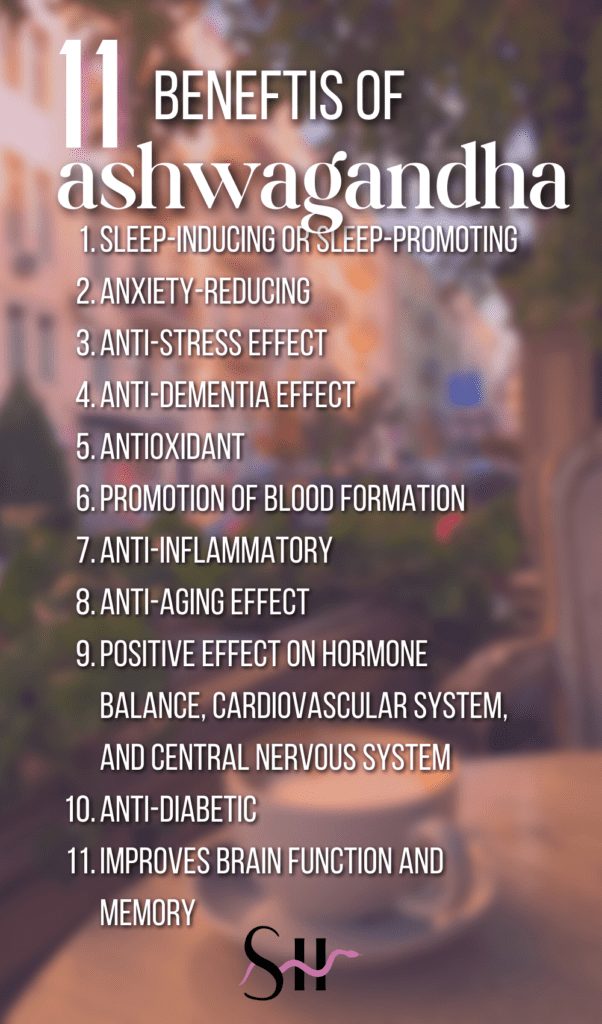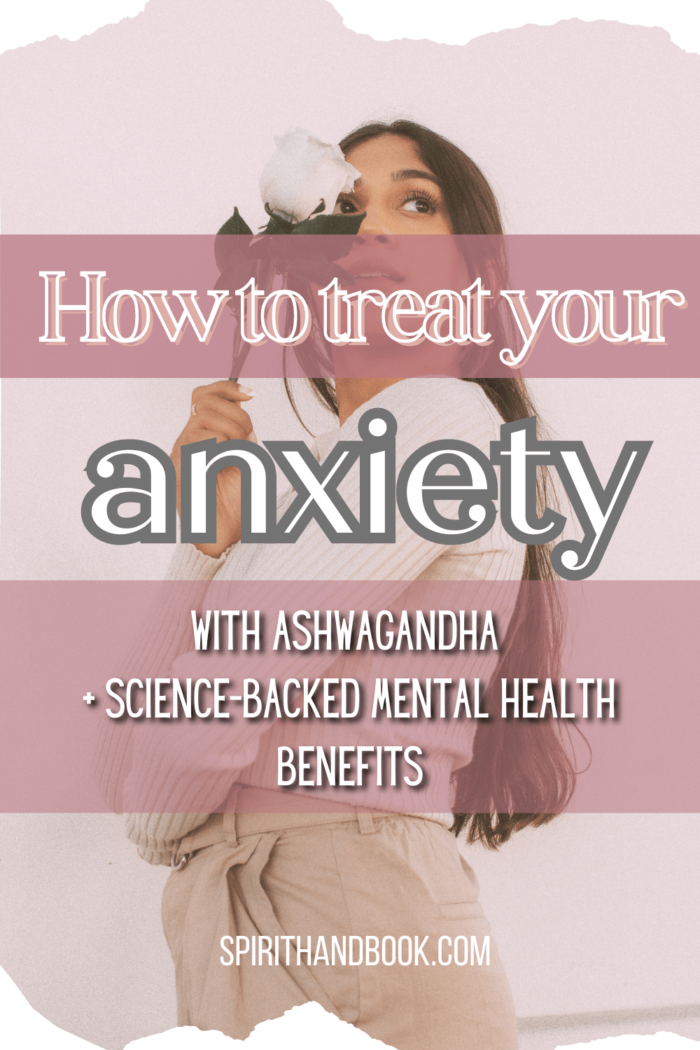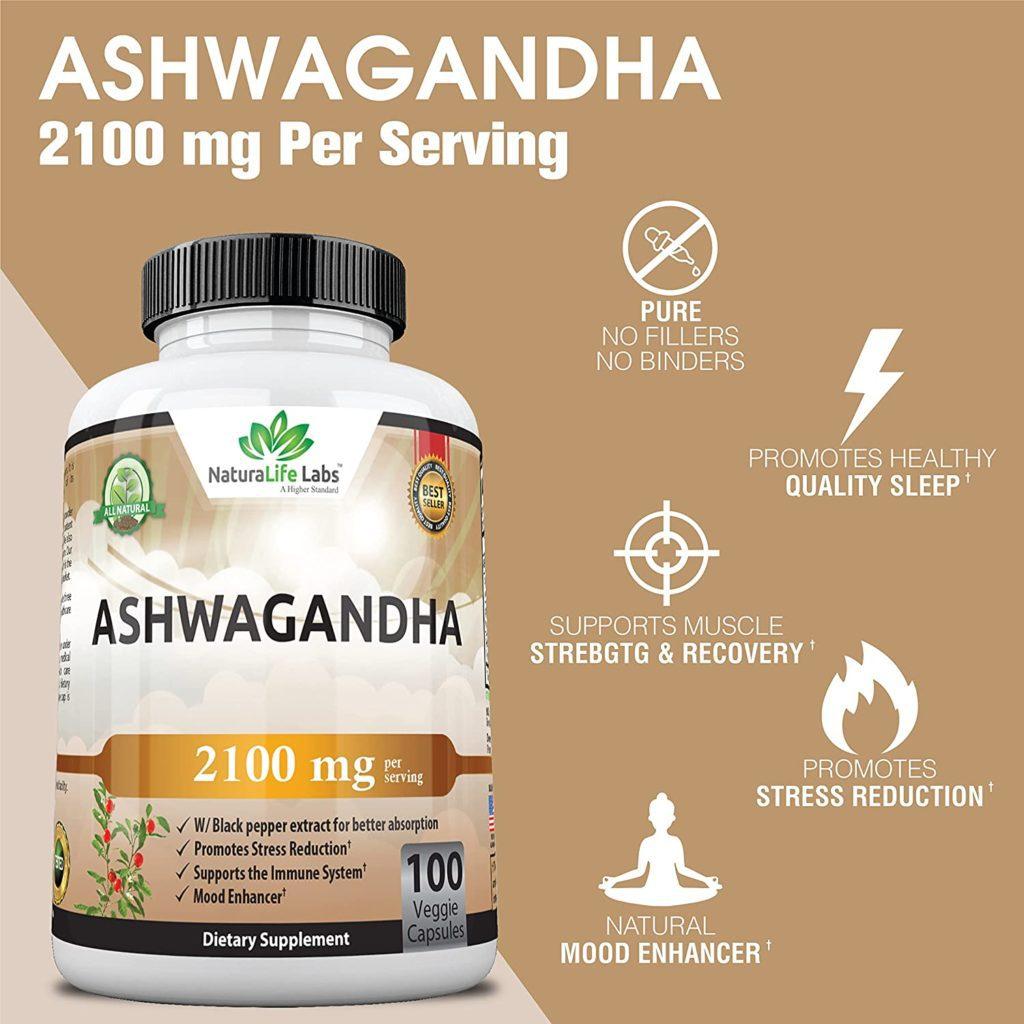Life (ayu) is the combination (samyoga) of body, senses, mind and reincarnating soul. Ayurveda is the most sacred science of life, beneficial to humans both in this world and the world beyond.
Charaka
It’s no secret that anxiety has become an all-too-common issue in our society today. With the rise of digital connectivity and over-stimulation, young people like you and me are particularly vulnerable.
We live in the prime time of anxiety. More people than ever before suffer from anxiety. In fact, anxiety disorders are the most common mental health condition in the US. There are many possible reasons why anxiety is on the rise, one of them being our excessive smartphone use.
This is also a reason why I stopped using Social Media, but this is another story you can read here.
If you experience anxiety, it might be worth considering Ashwagandha. Now in modern times, herbal medicinal products are also on the rise, again! 80 percent of people worldwide rely on them as part of their healthcare routine.
Ashwagandha is a medicinal herb that has been used for centuries in Ayurvedic medicine to reduce the effects of stress and anxiety. It works by regulating cortisol levels, reducing inflammation, and increasing essential neurotransmitters – all of which play a role in mental health.
Ashwagandha is one of the most significant medicinal plants in Ayurveda. And for me, well, it was and is a game changer.
In this article, we’ll explore how Ashwagandha can help improve mental health and alleviate anxiety. We’ll dive into the science behind it, discuss its benefits for stress, anxiety, and depression, and even cover how to take it.
You are welcome to leave me a comment on how Ashwagandha helped with your anxiety!
Please note: If you do experience anxiety I want to encourage you to try Ashwagandha but also to get in touch with a mental health professional. Although I do firmly believe in the power of alternative medicine like Ayurveda, I always suggest a combination of both – modern and alternative medicine.
What Is Ashwagandha And How Does It Work For Your Mental Health?
Ashwagandha is a herb that has been used for centuries in Ayurvedic medicine to treat a variety of ailments, including mental health issues such as anxiety and depression.
But what exactly is Ashwagandha, and how does it work?
Ashwagandha reduces stress
At its core, Ashwagandha is an adaptogenic herb, which means it helps the body adapt to stress and reduces its negative effects. It does this by regulating cortisol, the hormone responsible for the body’s fight-or-flight response. When cortisol levels are high, it can lead to feelings of anxiety and depression.
Ashwagandha has anti-inflammatory properties
Ashwagandha also contains compounds called withanolides, which have been found to have anti-inflammatory and antioxidant properties.
Inflammation has been linked to a number of mental health issues, including anxiety and depression. By reducing inflammation, Ashwagandha can help alleviate these symptoms and to improve overall brain function.
Ashwagandha increases GABA and Serotonin
Research has also found that Ashwagandha can increase the production of certain neurotransmitters, including GABA and serotonin. These neurotransmitters are responsible for regulating mood, and an imbalance can lead to anxiety and depression.
All of these factors combine to make Ashwagandha a powerful tool for promoting mental health and reducing anxiety and depression. But how exactly can you incorporate it into your daily routine? Let’s take a look.
What Are The Effects Of Ashwagandha On The Body?
Here are the most common benefits of Ashwagandha on the body and mind:
- Sleep-inducing or sleep-promoting
- Anxiety-reducing
- Anti-stress effect
- Anti-dementia effect
- Immunomodulatory (modulating the immune system)
- Antioxidant (reducing oxidative stress)
- Promotion of blood formation
- Anti-inflammatory
- Anti-tumor effect
- Anti-aging effect (increases DHEA levels, an anti-aging hormone)
- Positive effect on hormone balance, cardiovascular system, and central nervous system
- Anti-diabetic
- Improves brain function and memory

Benefits Of Ashwagandha For Anxiety and Stress
Ashwagandha has long been recognized as an adaptogen, which means it helps the body manage stress. Anxiety triggers your body to release cortisol and other stress hormones. This can cause a host of physical symptoms, such as elevated heart rate, shallow breathing, and muscle tension.
Studies have shown that Ashwagandha can help reduce the symptoms of anxiety and stress by lowering cortisol levels and calming the nervous system. One study found that taking a high-concentration, full-spectrum Ashwagandha root extract for 60 days led to a significant reduction in stress and anxiety, as well as improved overall well-being.
Another study even found that Ashwagandha was just as effective as the prescription anti-anxiety medication Lorazepam at reducing anxiety symptoms but with fewer side effects! This is why Ashwagandha can also act as a mood stabilizer.
Overall, Ashwagandha’s ability to reduce anxiety and stress is one of its most well-known and well-researched benefits.
Next, we’ll explore how Ashwagandha can support those dealing with depression.
Ashwagandha And Depression
In addition to its ability to alleviate anxiety, Ashwagandha has also shown promise in helping to combat symptoms of depression.
Ashwagandha has been traditionally used as an adaptogenic herb, known for its ability to help the body adapt to stressors.
A study explored the stress-relieving and pharmacological actions of an Ashwagandha extract. The results demonstrated that the extract enhanced resilience to stress in participants, suggesting its potential benefits in managing stress-related conditions, including depression.
Research has indicated that Ashwagandha has the potential to boost levels of serotonin, a neurotransmitter that is often associated with feelings of happiness and well-being. By increasing serotonin levels, Ashwagandha may be able to help improve mood and reduce feelings of sadness and hopelessness.
One study found that Ashwagandha was effective in reducing symptoms of depression in participants when compared to a placebo group.
If you suffer from depression and are interested in incorporating Ashwagandha into your wellness routine, it’s important to speak with your healthcare provider first. They can help you determine if Ashwagandha is a safe and appropriate addition to your treatment plan.
How To Take Ashwagandha For Mental Health And Anxiety
If you’re interested in taking Ashwagandha for its mental health benefits, there are a few different forms to consider. Ashwagandha is available in capsules, powders, teas, and tinctures. Capsules are the most convenient option, as they can easily be added to your daily supplement routine.
Powders can be mixed into smoothies or beverages, and teas can be consumed as a relaxing ritual. However, Ashwagandha isn’t known for its delicious taste. I’ve tried it and I don’t recommend it.
When it comes to dosing, it’s important to follow the instructions on the product label and consult with your healthcare provider. The typical dose ranges from 250-1500mg per day, but this can vary based on your individual needs and health history.
Should I take Ashwagandha Every Day?
Yes. Please note that Ashwagandha takes some time to show its effect on anxiety. I do recommend taking it for at least 3 months and then alternating it with herbs like Rhodiola Rosea, which also has similar effects on anxiety, stress, and depression.
However, I usually feel the benefits within a few days! It truly is a magic herb for me.
It’s also important to note that Ashwagandha should not be used as a replacement for any prescribed medications for mental health conditions. Your healthcare provider can help you determine if Ashwagandha is a safe and appropriate addition to your treatment plan.
Next, let’s take a closer look at any potential side effects of Ashwagandha.
Are There Any Side Effects Of Ashwagandha?
It’s always a good idea to be aware of any potential side effects before incorporating a new supplement into your routine. As with any supplement or medication, Ashwagandha may cause some unwanted side effects for some people.
One of the most common side effects of Ashwagandha is drowsiness or sedation. This is because the herb has a calming effect on the body, which can sometimes lead to feelings of tiredness or a lack of energy. This is usually not a cause for concern, but if you find that you are excessively sleepy or drowsy after taking Ashwagandha, you may want to talk to your healthcare provider about adjusting your dosage.
Another potential side effect of ashwagandha is gastrointestinal distress, such as upset stomach, nausea, or diarrhea. These symptoms are generally mild and temporary, and may go away on their own as your body adjusts to the supplement.
If you experience significant gastrointestinal discomfort, it’s a good idea to talk to your healthcare provider to make sure there isn’t an underlying issue.
Finally, some people may have an allergic reaction to Ashwagandha. This is rare but can be serious, so it’s important to seek medical attention if you experience any signs of an allergic reaction, such as difficulty breathing, swelling, or hives.
Conclusion: Ashwagandha Is A Natural Remedy For Anxiety
In conclusion, Ashwagandha is a natural solution that has been used for centuries in Ayurvedic medicine and has incredible effects on mental health and anxiety. The science behind Ashwagandha shows promising results, with numerous studies supporting its benefits for anxiety, stress, and depression.
For me and the people around me, Ashwagandha helped tremendously with our anxiety and stress symptoms. I feel more at peace, I am less overthinking and spiraling negative thoughts. It helped me sleep better and feel calm. Whenever I forget to take it, I do notice a negative change.
It is a supplement worth considering as an addition to your current treatment plan. Although it is a natural product, it is essential to consult with your healthcare provider before starting Ashwagandha.
My readers support Spirithandbook. When you buy through links on my site, I may earn some coffee ☕ money (which I promise to drink while continuing to support your spiritual journey ✨).







